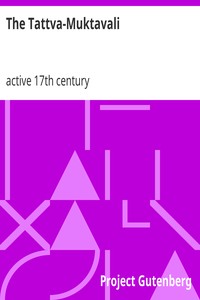The Tattva-Muktavali by active 17th century Gaudapurnanandacakravarti
"The Tattva-Muktavali" by Pûr.nânanda Chakravartin is a philosophical treatise written in the late 19th century, specifically during the 1880s. This work presents a compelling critique of the Vedânta philosophy from the perspective of the Pûr.naprajña school, which asserts the distinctness of individual souls from the Supreme Being, Brahman. Written in poetic form, the book engages with key theological debates of its time, making it a significant contribution to the discourse of Hindu
philosophical systems. In "The Tattva-Muktavali," the author embarks on a systematic argument to assert the duality between the individual soul and the Supreme Soul, Brahman. Through various poetic stanzas, Chakravartin challenges the monistic notions prevalent in Vedânta, arguing instead for a master-servant relationship, where Brahman is the omnipotent creator and the individual soul remains distinct and dependent. The poem employs analogies and examples to illustrate the differences between the two, positing that while the soul may experience absorption in Brahman, true identity cannot be claimed due to their inherent differences. The work not only critiques the ideas of affinity between Brahman and the soul but also emphasizes the need for worship and devotion towards Brahman, reinforcing a dualistic understanding of reality. (This is an automatically generated summary.)
Read or download for free
| Reading Options | Url | Size | |||
|---|---|---|---|---|---|
| Read now! | https://www.gutenberg.org/ebooks/7175.html.images | 78 kB | |||
| EPUB3 (E-readers incl. Send-to-Kindle) | https://www.gutenberg.org/ebooks/7175.epub3.images | 96 kB | |||
| EPUB (older E-readers) | https://www.gutenberg.org/ebooks/7175.epub.images | 95 kB | |||
| Kindle | https://www.gutenberg.org/ebooks/7175.kf8.images | 195 kB | |||
| older Kindles | https://www.gutenberg.org/ebooks/7175.kindle.images | 188 kB | |||
| Plain Text UTF-8 | https://www.gutenberg.org/ebooks/7175.txt.utf-8 | 67 kB | |||
| Download HTML (zip) | https://www.gutenberg.org/cache/epub/7175/pg7175-h.zip | 97 kB | |||
| There may be more files related to this item. | |||||
Similar Books
About this eBook
| Author | Gaudapurnanandacakravarti, active 17th century |
|---|---|
| Translator | Cowell, Edward B. (Edward Byles), 1826-1903 |
| Title | The Tattva-Muktavali |
| Credits | Originally scanned at sacred-texts.com by John B. Hare. This eBook was produced by Chetan K. Jain |
| Reading Level | Reading ease score: 65.6 (8th & 9th grade). Neither easy nor difficult to read. |
| Language | English |
| LoC Class | B: Philosophy, Psychology, Religion |
| Subject | Dvaita (Vedanta) -- Early works to 1800 |
| Subject | Hindu philosophy -- Early works to 1800 |
| Category | Text |
| EBook-No. | 7175 |
| Release Date | Dec 1, 2004 |
| Most Recently Updated | Dec 30, 2020 |
| Copyright Status | Public domain in the USA. |
| Downloads | 281 downloads in the last 30 days. |
| Project Gutenberg eBooks are always free! | |

